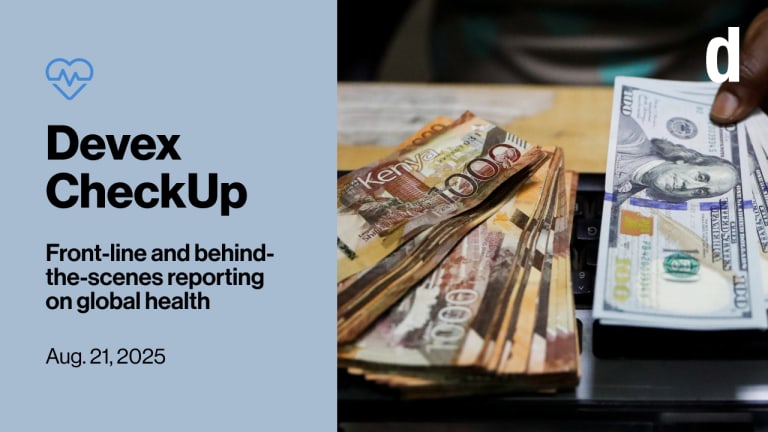
There is some suspicion around the increasing role of the private sector on global health care delivery, especially in developing countries, admits Geralyn Ritter, senior vice president of pharmaceutical company Merck’s global public policy and corporate responsibility department.
But the reality remains: The private sector now provides about half of the health care services in Africa and for roughly 80 percent of families in South Asia. In this context, talking about improving the quality of this care and the public-private coordination that enables delivery of health care make sense.
But are these talks providing a new direction for public-private partnerships when it comes to health care delivery?
Global maternal health advocacy organization Women Deliver co-hosted an event on the role of private providers expanding access to affordable, quality maternal health care Tuesday, Sept. 25, across the street from the U.N. headquarters, in the full swing of what’s known as U.N. week.
Women Deliver’s founder and president, Jill Sheffield, sat down with Devex to discuss the private sector’s role in implementing global health strategies and how reproductive rights is factoring into donors’ perspectives.
What does the future look like for private sector funding health initiatives?
There are some countries in Africa where almost 90 percent of health services are provided by the private sector. Now, it is not all the for-profit sector. Some of it is religious groups.
I think this is a real opportunity to make substantial progress. When you look at the street vendors in India who sell drugs and you look at the private midwives associations who deliver babies and you look at physicians in private practice — all of these are in different stages and different places, bubbling around, and I think it will play a much, much larger part because the governments simply can’t do the job. They just don’t have right now, the capacity, to do the job. But then we have to get really careful about quality control, because it is the quality of the care that is terribly important.
You attended the London Summit on Family Planning in July. Did you find that was an initiative to resurrect this topic of reproductive rights as a focal point in global health?
I think before reproductive rights, what they were trying to do was to re-legitimize family planning as a health sector opportunity and responsibility. There was a lot of tracking of investment in family planning and after the 1994 population conference in Cairo, the graphs all show a pretty dramatic decline in investments, both by donors and by countries. At the end of the Cairo meeting, on one of the last two days, the question was, “OK, we have this, but how are we going to pay for it?” So donor governments and foundations said, “OK, we will deal with a third.” And the developing countries themselves said, “Great. It is in our real interests to do this. So we are going to do two-thirds of this.” Guess who in the end did it? The [developing] countries. … In the end, [donors] didn’t live up to what they promised. It’s a really important lesson. When you do it right, governments see that it is in their interests. Family planning saves lives — it saves governments money. So they got that message and they made their investments.
You can look in Asia now — Indonesia is a perfect example, where something called the demographic dividend is happening. It means that the governments made investments, decades ago, in education and health and family planning andtodaythey are reaping the benefit of that. There are smaller families of higher, better trained workforce — more people have more jobs. The dependency ratio is lower, so those governments knew it and believed it, but not all of them.
Are donors talking about this issue more now do you think?
Yes, much more so. The World Bank has been talking about the demographic dividend for a little over the past year. And the finance ministers’ meeting a year ago now had a major focus on it, as did the family planning meeting in Dakar at the end of November. And it so happens that the social investments are the ones that have major payoff — education and health, including family planning.
Who is tracking those London pledges — what is the follow up looking like in terms of tracking them?
There are quite a few groups that are looking at this. For example, the independent expert review group that came out of the secretary-general’s commission on accountability, which I had the total privilege to be on. We negotiated what it was we were going to measure. And part of it was finances and part of it had to do with the metrics of what shows the best investment. And so the independent review group is going to track it. I’m sure the British government is tracking it and I am sure that smart people at [Bill & Melinda Gates Foundation] are tracking it.
Does civil society have a role to play in all of this?
Civil society had a huge role to play in all of this. The [International Planned Parenthood Federation] mobilized 1,300 different organizations that signed a pledge, which is unprecedented. There were a number of civil society groups that made pledges at the July 11 session. And they continue to gather importance and differences and I just think — civil society was noticeably there and this is new. It is a new way of working. It’s not just governments. It’s not just civil society, or just the private sector. It’s all of them working together.
Check out our New York topic page to see more of our conservations with other global development luminaries who were in the city for U.N. week.








